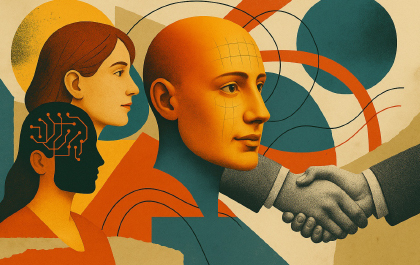Artificial Intelligence (AI) is rapidly reshaping industries, redefining relationships, and pushing the boundaries of what technology can achieve. As AI’s capabilities grow, so too do the legal complexities surrounding its use and development.
When disputes inevitably arise—whether over intellectual property rights, system failures, data usage, algorithmic bias, or ethical considerations—parties must choose how best to resolve them.
Lengthy, costly, and public court-based litigation is not the best fit for disputes involving something as innovative and fast-moving as AI.
Instead, mediation offers a far more effective, efficient, cheaper and flexible alternative.
In this article, I explore 10 compelling reasons why parties involved in AI-related disputes should opt for mediation as the conflict resolution process of choice.
In a world where AI development constantly outpaces regulation, mediation gives parties an incredibly flexible power to define their own resolution processes and types of outcomes.
Unlike court proceedings, which are bound by rigid rules and precedent, mediation is bespoke, party-driven, and creative. It is limited only by the art of the possible and the collective imaginations of the parties.
This flexibility is critical when dealing with novel or highly technical issues, where no clear legal authority may yet exist and where the traditionally binary outcomes of legal processes may be unhelpful.
AI-related disputes often involve highly sensitive information—proprietary code, data sets, algorithms, or strategic plans.
Unlike litigation, where proceedings and outcomes are largely resolved in public, mediation can be entirely confidential.
Settlements can be kept private, helping to protect commercial interests, trade secrets, and reputational value.
Court proceedings can drag on for years, draining time, and vast quantities of money and management attention.
By contrast, most mediations conclude within a much shorter timeframe, often in a single day.
Costs are largely limited to mediator fees with much less legal preparation, avoiding the massive expenditure of litigation.
In a field like AI, where speed to market is critical, mediation keeps businesses moving forward rather than bogged down in a quagmire of endless dispute.
Litigation tends to focus strictly on the determination of legal rights. Mediation, however, allows parties to address common interest and wider commercial, ethical, or practical concerns.
Mediation is not a zero-sum game. This can lead to outcomes that a court could never impose—such as licensing arrangements, collaborative partnerships, profit-sharing, agreed changes to product design, or public joint statements. In the dynamic world of AI, such creative solutions are often far more valuable than a binary win/lose judgment.
Even if mediation does not achieve a full settlement, it can be an effective means to narrow the issues and clarify the real points of disagreement.
This streamlining can make any subsequent litigation or arbitration faster, cheaper, and less adversarial.
When dealing with complex AI disputes—where technical detail can overwhelm proceedings—this is a major advantage.
Mediation can be used flexibly to incorporate neutral technical experts to help parties understand complex AI issues.
In court, technical evidence must follow strict evidential rules and can often confuse more than clarify.
In mediation, parties can more readily engage a joint expert to explain or model a system’s functionality, leading to better-informed decisions. Alternatively, they could have experts sitting in the mediation participating actively in the discussions and giving input as to the practicality of proposed solutions.
For AI disputes involving cutting-edge technology, this sort of technical agility can be game-changing.
Beyond the obvious savings in time and legal fees, mediation also reduces opportunity cost.
For parties in the AI sector, where innovation cycles are rapid and competitive advantage can be fleeting, prolonged litigation is an expensive distraction.
Mediation preserves resources—human, financial, and reputational—that can be better invested elsewhere.
Statistically, mediation boasts a remarkably high success rate.
The majority of mediations settle on the day or within a short time afterwards. This makes mediation a low-risk, high-reward strategy for resolving disputes.
In a rapidly evolving sector like AI, where uncertainty can be paralysing, the ability to reach a swift, certain, and binding resolution is immensely valuable.
AI is far from being a static field: it evolves constantly, on an almost daily basis.
Rigid court procedures are poorly suited to disputes over such a fluid and developing technology.
Mediation’s informality and adaptability allows it to keep pace with innovation, facilitating settlements that can be adjusted to reflect commercial realities as they develop.
In the close-knit AI community, today’s adversary may be tomorrow’s collaborator—or investor, or customer.
Court battles often destroy relationships permanently.
Mediation, by contrast, is future-focused and designed to preserve, reshape, or even strengthen commercial ties.
For AI businesses seeking to maintain credibility and partnerships, this relational preservation can be at least as important as the terms of settlement.
Why Avoid AI Litigation?
Choosing litigation for AI disputes carries serious risks:
Given these challenges, it is hard to imagine a dispute resolution method less well suited to AI than traditional litigation.
Conclusion: Mediation is the Smart First Choice for AI Disputes
Mediation offers confidentiality, flexibility, effectiveness, speed, expertise, creativity, and relationship preservation.
It is better equipped to handle the complex, technical, and fast-moving nature of AI disputes than the blunt tools of litigation.
As AI continues to transform the commercial and legal landscape and the daily lives of ordinary people, parties who choose mediation will find themselves better protected, better prepared, and better placed to thrive in this new frontier.
If you are involved in an AI dispute, mediation isn’t just a good option.
It is, in many cases, the only sensible one.
Littleton Chambers has a team of experienced mediators and mediation advocates who can help resolve AI-related disputes quickly, efficiently and confidentially.
